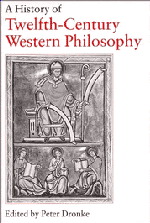Book contents
- Frontmatter
- Contents
- Preface
- Contributors
- List of abbreviations
- Introduction
- I Background
- II New Perspectives
- III Innovators
- 9 Anselm of Canterbury
- 10 Peter Abelard
- 11 William of Conches
- 12 Gilbert of Poitiers
- A note on the Porretani
- 13 Thierry of Chartres
- 14 Hermann of Carinthia
- IV The Entry of the ‘New’ Aristotle
- Bio-bibliographies
- General Bibliography
- Index of Manuscripts
- General Index
12 - Gilbert of Poitiers
Published online by Cambridge University Press: 01 June 2011
- Frontmatter
- Contents
- Preface
- Contributors
- List of abbreviations
- Introduction
- I Background
- II New Perspectives
- III Innovators
- 9 Anselm of Canterbury
- 10 Peter Abelard
- 11 William of Conches
- 12 Gilbert of Poitiers
- A note on the Porretani
- 13 Thierry of Chartres
- 14 Hermann of Carinthia
- IV The Entry of the ‘New’ Aristotle
- Bio-bibliographies
- General Bibliography
- Index of Manuscripts
- General Index
Summary
There is one distinction which Gilbert of Poitiers uses so pervasively in his masterpiece, the commentary on Boethius' Opuscula sacra, that it is difficult even to begin an account of his thought without explaining it. According to Gilbert, everything except God is what it is (quod est) by virtue of something which makes it so (quo est). For instance, a man is what he is (a man) by humanity; a stone is a stone by stone-ness; a white thing is white by whiteness, a rational thing rational by rationality, a body corporeal by corporeality, Plato Plato by Plato-ness. Gilbert calls the men, stones, white things, rational things, bodies, Plato quod ests; the humanity, stone-ness, whiteness, rationality, corporeality and Plato-ness quo ests. Whether such a distinction is valuable, trivial, or merely confusing depends on how it is used and developed. What, more precisely, are quo ests? And what is made of the fact that, for example, Plato is Plato, a man, a white thing, a rational thing and a body? Gilbert's answers to these questions will be examined in due course. To consider them immediately would lead to a particular view of Gilbert's interests and strengths as a thinker, one which is widely accepted, and which this chapter will dispute.
- Type
- Chapter
- Information
- A History of Twelfth-Century Western Philosophy , pp. 328 - 352Publisher: Cambridge University PressPrint publication year: 1988
- 6
- Cited by



